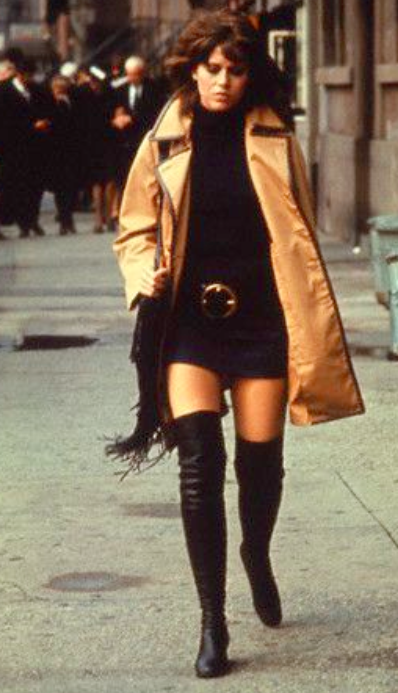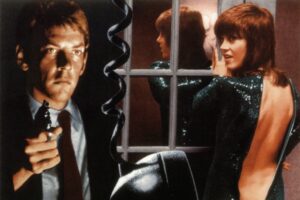 The sudden reemergence of The Many Faces of Lady Hanoi Jane Vadim Hayden Turner Fonda (a possibly ill-advised return from retirement, the new book) has inspired me to revisit Klute (1971). In it, she portrays Bree, a stalked prostitute who spends her free time shtupping detective Donald Sutherland, then processing the affair with such a clinical remove that it as if she’s her shrink’s colleague, not client. Like everything else Fonda, her depiction of Bree shouldn’t be as effective as it is.
The sudden reemergence of The Many Faces of Lady Hanoi Jane Vadim Hayden Turner Fonda (a possibly ill-advised return from retirement, the new book) has inspired me to revisit Klute (1971). In it, she portrays Bree, a stalked prostitute who spends her free time shtupping detective Donald Sutherland, then processing the affair with such a clinical remove that it as if she’s her shrink’s colleague, not client. Like everything else Fonda, her depiction of Bree shouldn’t be as effective as it is.
No matter what the role, Fonda never ditches her clipped, boarding-school diction. The effect is distancing–even condescending–though she sometimes may intend the opposite, especially when portraying working-class women (as in Stanley and Iris) or working girls (as in Klute). Those precise, strident tones–dare I call them “brays”–ring hollow, as if she holds these women at such bay that she is speaking of rather than as them.*
But in Klute that distance works, partly because Bree is someone who holds herself at bay. She also brilliantly evokes that hush which creeps into a life unpopulated by real human connection. In her presence, even Sutherland seems uncharacteristically muted. Alone in her poorly lit rooms, she smokes dope, leafs through books, stares down her ugly walls with the grim resignation of someone who knows a silence that threatens to extend forever. Backlit by Gordon Willis’ gorgeously melancholy cinematography, she luxuriates in her isolation as if it were warm, dirty bathwater. You feel rather than observe that she can tolerate no intruder save her cat, and that kindness unwires her, even angers her, however irrational she recognizes that fact to be.
Klute is not a terrific movie by any stretch of the imagination. It falls prey to many ‘70s movies pitfalls, including a surplus of self-important pauses and poorly built suspense. (A high, female voice accompanied by  a single piano note does not in and of itself conjure fear.) But the first time I saw it I’d been alone for a long, long time, and it felt so familiar it was as if I were kissing my own arm.
a single piano note does not in and of itself conjure fear.) But the first time I saw it I’d been alone for a long, long time, and it felt so familiar it was as if I were kissing my own arm.
*Also, why hasn’t anyone pointed out that Shue’s prostitute character in Leaving Las Vegas draws so much on Fonda’s Bree? Both women strut and speechify with that aggressively middle-class can-do assertiveness, and both films deploy that oy-vey storytelling technique of a broad confiding in her off-camera shrinks while jazz trumpets bleakly.
